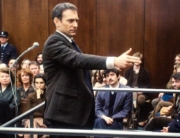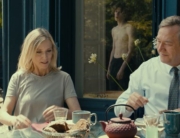Although fetishizing food has become a cottage industry, with far too many food shows on TV and streaming, food porn is much better when seen on a big screen, filmed by world-class directors. Case in point: the culinary eroticism—a better euphemism than food porn—in Tran Anh Hung’s latest film. Set in 1885 at a rural French chateau, it follows the relationship between a wealthy epicure, Dodin, and his beloved cook of the past two decades, Eugénie. Indeed, Hung (The Scent of Green Papaya)—who won best director at this year’s Cannes Film Festival—and his expert cinematographer, Jonathan Ricquebourg, begin the film by lingering over Eugénie making a multicourse dinner for a gathering of men Dodin is hosting. The camera roves about the kitchen trying to catch every detail as it follows Eugénie meticulously preparing each course—the viewer can almost savor the aromas.
Eugénie and Dodin are, in modern parlance, friends with benefits. Their relationship is intimate, but not official. He has been asking her to marry him for years, but she demurs, not ready to take the plunge. Hung takes time teasing out what little there is of a story, especially when Dodin’s young niece, Pauline (Bonnie Chagneau-Ravoire), arrives to spend time at the house and proves herself a culinary natural, although Dodin explains that it takes years—even decades—to become an expert in such a refined field. Later, when Eugénie falls ill—her occasional fainting spells have already signaled that all is not well—Dodin cares for her. That includes creating an exquisite meal for her, which also expresses his love for her the best way he knows how. When she digs into the flaky dessert he serves, she finds a ring and that convinces her, finally, they should marry.
As Eugénie and Dodin, Juliette Binoche and Benoît Magimel make a beautifully restrained couple. They may not create sparks in the conventional sense, but that doesn’t mean there’s a lack of chemistry. Rather, the joy in their lives comes from subtle moments, like culinary creations, and not overt emotion. This also could be said of the movie as a whole.
In 2000, Binoche starred in Chocolat, a slight concoction in which delicious treats affect the repressed denizens of a French village. But while I watched The Taste of Things, I thought of Gabriel Axel’s masterly Babette’s Feast (1987), which visualized the great, seemingly irreconcilable conflict between the spirit and the flesh, culminating in the ravishing title meal, which was also an expression of gratitude. That these films are European in origin is unsurprising since the old world has always taken its food more seriously than in the United States. Even an entire film, Luis Bunuel’s The Discreet Charm of the Bourgeoisie (1972), was made about the thwarted desire to have a good meal.
If Tung’s film falls between the triviality of Chocolat and the wisdom of Babette’s Feast, it’s mainly because the subtext is largely that food is love, which isn’t very illuminating. But by ending with two 360-degree pans around the kitchen (well, the second one ends just short of a complete revolution) that has hosted so many sumptuous meals, Tung marvelously returns to the past with a flashback of the couple sharing an intimate moment at the table. Eugénie asks Dodin, “Am I your cook or your wife?” After a pause, he answers, “My cook.” She smiles and says, “Thank you.”







Leave A Comment